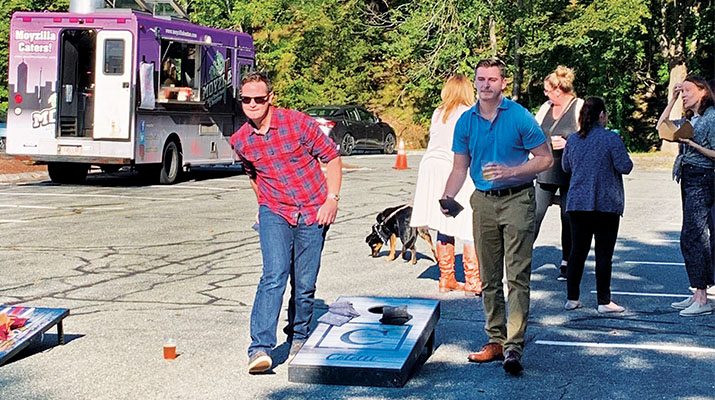Company culture: Propane refines approach to recruitment, retention
Workin’ 9 to 5, what a way to make a livin’
Barely gettin’ by, it’s all takin’ and no givin’
They just use your mind and they never give you credit
It’s enough to drive you crazy if you let it …
Sing it, Dolly!
Who doesn’t love to belt out this anthem against the “boss man” climbing the ladder at the expense of the real workers, who just get passed over for that “fair promotion”?
That might’ve been the case in the 1980s, when Dolly Parton’s “9 to 5” hit song and movie debuted, but thankfully lots of companies have made it their mission to change that.
Today, aided by shifting priorities, labor-market realities and, well, evolution, companies in the propane industry are intentionally creating flexible and positive work cultures that retain employees, recruit talent and reward the often unsung heroes directly responsible for their success.
For some, that takes the form of offering flexible work schedules, facilitating work from home, celebrating life’s milestones, encouraging camaraderie or just instilling a communal pride in the company’s mission. And they’re discovering that these attributes, once considered “extra,” help boost the bottom line in the long run.
A sense of team
At Gray, Gray & Gray, the tax, accounting and business advisory firm serving the propane industry, employees recently were treated at their Canton, Massachusetts, headquarters to a day with food and beer trucks. No work was to be done; the event centered on building chemistry among the staff.
“We have a set of core values we live by, and the most important one is to create a culture of helpfulness. We are always helping one another. Nobody is in a silo,” says Marty Kirshner, who heads the firm’s energy business practice group. “Teamwork is everything with culture. You’re investing in long-term happiness.”

Employees at Gray, Gray & Gray are treated to food, drinks and fun while building chemistry among the staff. (Photo courtesy of Gray, Gray & Gray)
Meanwhile, employees at Rural Computer Consultants (RCC) regularly get treated to breakfast cooked in the office on Fridays thanks to a rotating breakfast club offering a diverse and tantalizing menu, as a way to boost morale.
“I pair up with a couple of co-workers,” says Freddie Ridler, head of business growth. “We’re always trying to mix it up, and it’s fun because on Friday mornings the whole office just smells like breakfast.”
On such days, the Minnesota-based software-solutions firm will see almost double the in-office employees, thanks to the creativity of these food offerings, Ridler says. And twice a year, the company will sponsor corporate outings built around fun that’s completely unrelated to their work, like a Renaissance Faire or Top Golf. Later this fall, they’ll celebrate a “HalloThankMas” party complete with presents.
“We’re always trying to give back to our employees because without them our company would not be growing,” he explains.
It’s not all fun and games: These companies still expect hard work and long hours. But those hours might be outside the “9 to 5” once considered standard.
Chelsea Uphaus, Roush CleanTech’s director of marketing, works primarily from her Livonia, Michigan, office. But, like other working parents, Uphaus shifts to her home office one or two days a week if she’s not traveling.
“I have three young kids, so it’s very important to me to be able to drive my kids to school and do after-school activities with them,” she says. “I work a lot of hours before 7 a.m. and after 8 p.m., if it comes to that.”
ThompsonGas’ Jessica Johnson and Jessie Morgan agree. Balancing work and family is possible through flexibility in their schedules. They say logging on at earlier hours or in the evening can prove more productive while allowing them to stay present in their home lives. It’s also comforting for them to know that their employers support their adaptations.
“It’s really having the flexibility throughout your day to get everything done that you need to, and make sure that you eat some lunch and spend time with your family,” says Johnson, the administrator of growth projects for ThompsonGas.
Employers who respect their staff enough to trust they will get their work done – even if the method or schedule seems unconventional – make employees feel valued, and valued employees are more likely to invest and stay, Kirshner says.
“It takes a lot of trust to make it work,” he acknowledges. “We all know what we need to get done, and as long as everyone gets work done by the deadline, we’re happy. More often than not, people hit their deadlines.
“As long as my teams are delivering things to me, then we’re good,” he adds. “There’s people who aren’t as good at that, and you have to pay closer attention to them. But this is the future, and this is how we have to adapt.”
Remote work
Many employers were forced to adopt work-from-home arrangements during the COVID pandemic; some of them learned it wasn’t so bad.
For a software company like RCC, remote work might be more productive, although it comes at the expense of friendships forged in the hallway.
“We’re not required to come in; encouraged is a better word for it,” Ridler says. “After COVID, we realized their productivity is almost better in a home environment where they are comfortable, where they can be there for their kids.”
And the employee pool expands when a company isn’t limited to those who can show up behind a desk. Now the staff includes some who reside currently in 13 states.

Social events are one way to build rapport, camaraderie and loyalty among employees. (Photo courtesy of Gray, Gray & Gray)
The ability to work from home helps balance a job that requires a lot of travel or after-hours calls. Johnson says work/life balance is a primary value for Maryland-based ThompsonGas. Managers make it clear that employees may work from home or take time to address family needs that arise, she says.
“For me, it says a lot that we work for a company that trusts us to keep our word and have the integrity to do our jobs,” Johnson says.
Hybrid work cultures aren’t for everyone, though.
Some jobs, like customer service representatives, bobtail delivery personnel or service technicians, simply require face-to-face interaction. Lakes Gas, for example, prides itself on having its doors open so customers can drop by to talk with a representative, says Steph Hennen, manager of marketing.
And working from home can be isolating. Recent college graduates in their first job might find it intimidating to contact a co-worker over the phone when they’re working from their childhood bedroom at their parents’ home, Kirshner notes, but they’d approach someone at the proverbial water cooler.
Lakes Gas ensures employees know they are valued by supporting causes within their communities – whether that’s sponsoring an employee’s son’s high school wrestling team or donating to a local charity, Hennen says.
Creating a positive culture really can be as basic as taking time to make sure employees know they matter.
“As we continue to employ younger individuals, having a culture where people feel included, where they feel that their opinion is important, is something people my age really value and look for in a company, to know they’re putting time and effort into us as individuals,” Hennen says. “We really want our employees to know that we’re there for them. We’re a family-owned business, so we understand the importance of family and making sure that your personal life and work life work together.”
Personal and professional growth
Supporting employees’ personal growth within and outside their walls is key.
Kirsten McAlpin, director of marketing and public relations at Conger LP Gas, will graduate in December with her master’s degree from West Virginia University, and CEO Dan Richardson and her colleagues have fully supported her along the way. Richardson also provides opportunities for employees of the Tifton, Georgia, marketer to learn new skills through the Propane Education & Research Council’s Learning Center and other continuing education courses, she says.
In a world where the average employee will have 10 jobs before they’re 30, Kirshner says, growth opportunities and a clear path to advancement help employees know they don’t have to leave a company to feel fulfilled. This not only keeps employees content, but it saves the company money by not having to find, recruit, train and develop new employees.
“It is so much more expensive to replace an employee than to keep them,” he says. “It’s one of the biggest costs an employer will have.”
Hennen, who helped create the International Association of Young Gassers’ 30 under 30 Program, is in her third job since she graduated college six years ago. She says companies must show employees that they have room to grow, by advancing to jobs with increased responsibility or training for a new role that offers a different challenge.
“I will tell people until they’re blue in the face that if you don’t invest into your employees, they’ll find another company who will,” Hennen says. “If that happens, they may leave our industry, and that’s not good for anybody.”
Creating and maintaining a positive company culture is good for business, but ultimately it’s about treating people well – and that benefits everyone.
“I think when you have happy employees, they’re productive,” Johnson says, “and they’re willing to work harder for you.”
















